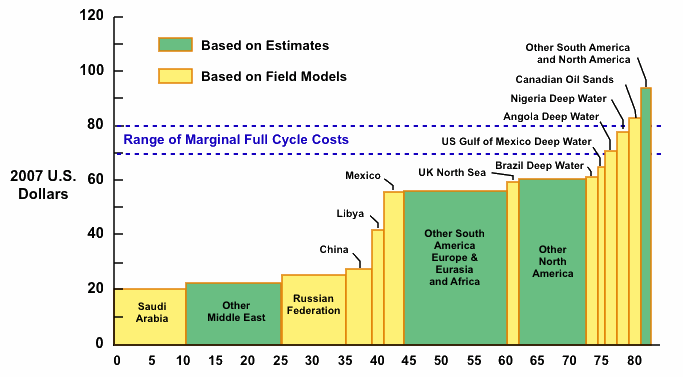Hi, everyone. I hope I can join the conversation...I'm happy to represent the view that oil has peaked or will peak very soon.
I think it's important to put the near peak models in context. What seems to be happening is that the far peak models are moving closer in time so that we have the following situation:
- (2010-2012) Association for the Study of Peak Oil and Gas — the people raising the alarm
- (2015) Shell Oil ("reach a plateau") — see their website for their latest scenarios "Blueprint" and "Scramble" (http://www.shell.com/scenarios)
- (2020) Neftex/Toyota — this only happens if three conditions are met: Iraq must increase its production to 8mb/d (from its current ~2mb/d), Saudi production must not decline at all and each expensive project that has been fiscally sanctioned must come in on time
- (2020) IEA — for this peak date, the oil industry must put into production the equivalent of four Saudi Arabia's in twenty years to maintain current production, six Saudi Arabias if growth resumes
- (no date) DOE — the Department of Energy does not put out peak oil models, they put out consumption models and assume the oil industry will supply the oil. People then mistake these for supply models and this is the source of untold planning errors by third parties using DOE graphs.
Then there is the CEO of Total Christophe de Margerie who has continually lowered his estimate of peak production so that it is now down to 90mb/d.
Given the above, it seems like a near term peak is almost certain since the assumptions of the other models are unlikely, in my view, to come to pass. For instance, $170B worth of oil projects have been cancelled in the last nine months due to the credit crunch and reduced near-term oil use projections. (See the various megaproject databases for more on that.) That's why the near peakists are asserting that we will never surpass the production of last summer. The projects to do so are no longer on the books and depletion marches on.
There are some outlier models like CERA but they have recently backed away from their view because it was clearly untenable (peak in 2030) and they were increasingly looking "out of touch."
Once one has satisfied oneself that we will have a near peak, then it makes sense to focus on the near peak models as Samual Foucher does on The Oil Drum.
One could quibble over whether the peak is in this decade or it will show up early in the next decade but asserting that it will occur past 2020 requires some awfully optimistic assumptions.
On the matter of costs for the marginal barrel of oil, CERA has put out this graph. While it is a little dated (> one year old) it shows the relative costs well. Prices have come down perhaps 15%-20% since the graph was made.
And of course the net export problem is real and is going to cause what I call "The Great Oil Squeeze" — top line production will decrease while oil-producer consumption will go up increasingly leaving less oil available to the world market. With gasoline at 20 cents (Venezuela) or 90 cents a gallon (Saudi Arabia), there is simply no reason in these producer countries to conserve and their populations continue to rise.
-André



 Reply With Quote
Reply With Quote








Bookmarks